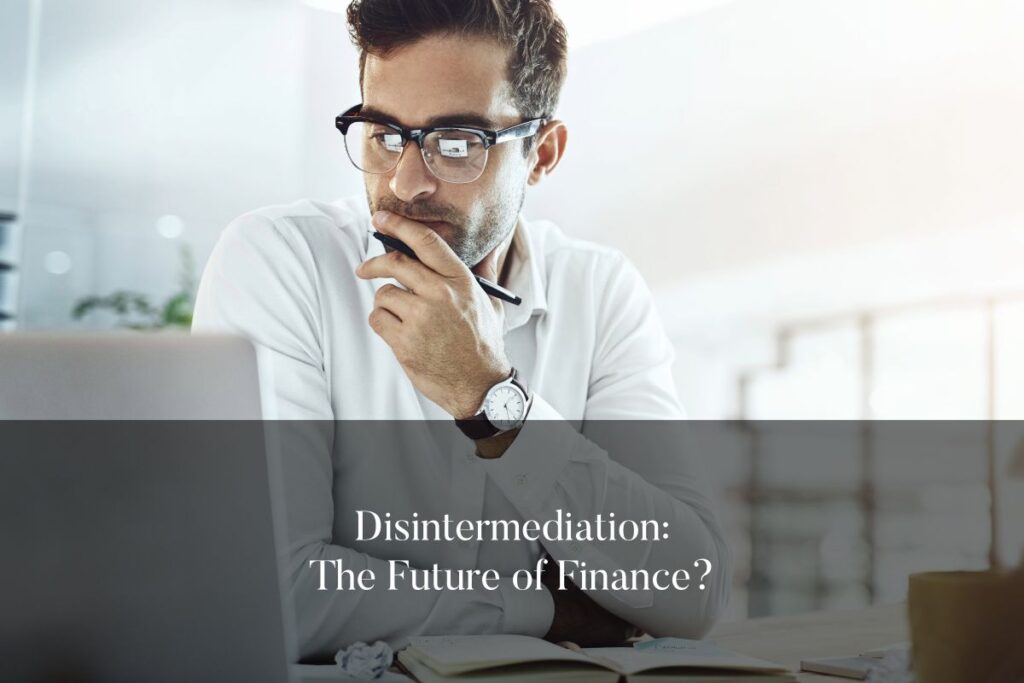Understanding and Navigating the Potential Impact
In the ever-evolving landscape of finance, disintermediation has emerged as a concept that challenges traditional financial models and intermediaries. Financial advisors are finding themselves at the forefront of navigating this paradigm shift, as the industry witnesses a transformation driven by technological advancements and changing consumer behaviors. Below, we’ll explore the concept of disintermediation, its implications for the financial sector, and the crucial question: Is it the future of finance?
Disintermediation: What is It?
Disintermediation refers to the removal or reduction of intermediaries in a supply chain or transaction process. In the context of finance, it involves the direct interaction between parties, bypassing traditional intermediaries like banks, brokers, and other financial institutions. Technology plays a pivotal role in enabling this direct connection, empowering consumers to access financial services and products without the need for traditional middlemen.
The Drivers of Disintermediation
1. Technology Advancements
Rapid advancements in technology, particularly the rise of blockchain, artificial intelligence, and decentralized finance (DeFi), have paved the way for disintermediation. Smart contracts, for instance, facilitate self-executing agreements, reducing the need for intermediaries to oversee and enforce transactions.
2. Changing Consumer Preferences
Modern consumers increasingly value convenience, transparency, and accessibility. Disintermediation aligns with these preferences by providing direct access to financial products and services, reducing costs and streamlining processes. Peer-to-peer lending platforms, robo-advisors, and crowdfunding exemplify how consumers are embracing these alternatives.
3. Globalization and Connectivity
The interconnected nature of the global economy has fueled the need for efficient and seamless financial transactions. Disintermediation allows for cross-border transactions without the complexities and delays associated with traditional intermediaries, promoting financial inclusivity.

So, What are the Implications for Financial Advisors?
Financial advisors, traditionally seen as intermediaries connecting clients with investment opportunities and financial products, face both challenges and opportunities in the era of disintermediation.
1. Threats to Traditional Revenue Models
Disintermediation poses a threat to the traditional revenue models of financial advisors, as clients may seek lower-cost alternatives or choose to manage their finances independently through online platforms. You can adapt to these changes by providing value-added services that go beyond transactional facilitation.
2. Embracing Technology
If financial advisors want to stay relevant, then embracing technology is a must. Utilizing data analytics, artificial intelligence, and digital platforms can enhance the efficiency of your advisory services. Robo-advisors, for example, combine technology and algorithmic decision-making to provide automated investment advice, catering to a growing segment of tech-savvy clients.
3. Educating Clients
In a disintermediated landscape, educating clients becomes paramount. You can differentiate yourself by offering expertise, guidance, and personalized advice that automated platforms may lack. Empowering clients with financial literacy and demonstrating the value of professional advice are essential components of adapting to the changing environment.

The Future of Finance: Disintermediation or Coexistence?
While disintermediation has undeniably disrupted traditional financial models, the question remains: Is it the future of finance, or will it coexist with traditional intermediation?
1. Coexistence and Collaboration
Many experts argue that the future lies in a harmonious coexistence of traditional and disintermediated finance. Rather than completely replacing intermediaries, technology can be harnessed to enhance their capabilities. You have the opportunity to evolve into technologically enabled guides, leveraging digital tools to better serve your clients and navigate the complexities of the modern financial landscape.
2. Regulatory Considerations
The regulatory environment will play a pivotal role in shaping the future of finance. As disintermediation gains momentum, regulators may need to adapt to ensure consumer protection, security, and the stability of financial markets. Striking a balance between innovation and regulation will be essential to foster a healthy and sustainable financial ecosystem.
3. Consumer Trust and Confidence
The success of disintermediation hinges on consumer trust. As a financial advisor, with your expertise and ethical standards, you can play a crucial role in building and maintaining trust in an industry increasingly driven by technology. Establishing transparent communication channels and emphasizing the value of human expertise can be key differentiators in a competitive market.
Final Thoughts
Disintermediation is reshaping the financial landscape, presenting both challenges and opportunities for financial advisors. While technology-driven changes may disrupt traditional revenue models, you can adapt by leveraging technology, focusing on education, and providing personalized value to clients. The future of finance may well involve a coexistence of traditional and disintermediated models, with the key to success lying in the hands of the advisors. As you navigate this evolving landscape, a proactive approach to embracing innovation and staying abreast of regulatory developments will be crucial for sustained success in the industry.
As the financial landscape undergoes a transformative shift towards disintermediation, financial advisors must equip themselves with the knowledge and tools needed to thrive in this evolving environment. TriCapital Wealth Management is committed to empowering financial professionals with cutting-edge insights, technology solutions, and a collaborative community to navigate the challenges and seize the opportunities presented by disintermediation. Explore how we can support your journey in adapting to the future of finance. Together, let’s shape the future of this industry!











